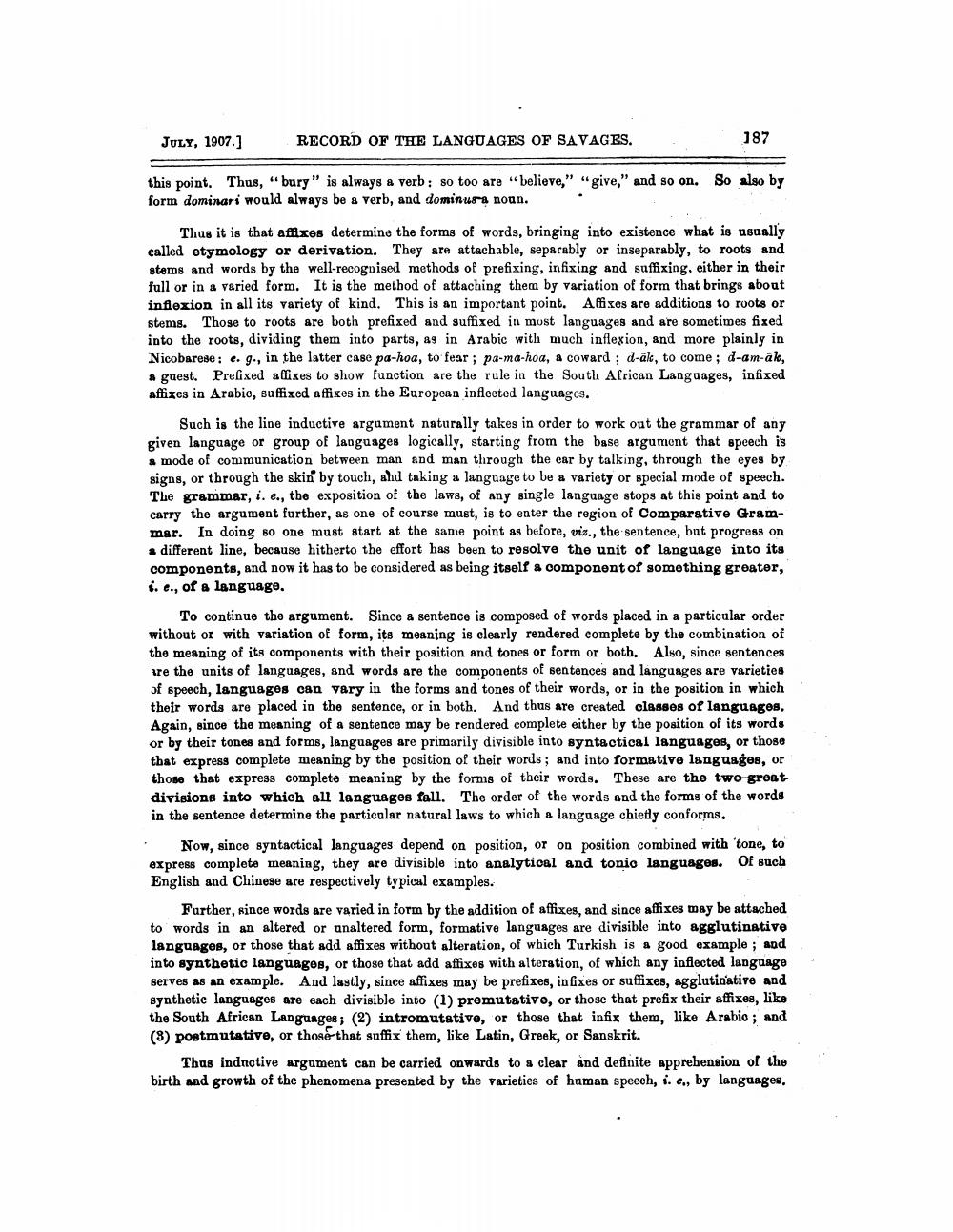________________
JULY, 1907.]
RECORD OF THE LANGUAGES OF SAVAGES.
187
this point. Thus, "bury" is always a verb: so too are "believe," "give," and so on. So also by form dominari would always be a verb, and dominus a noun.
Thus it is that affixes determine the forms of words, bringing into existence what is usually called etymology or derivation. They are attachable, separably or inseparably, to roots and stems and words by the well-recognised methods of prefixing, infixing and suffixing, either in their full or in a varied form. It is the method of attaching them by variation of form that brings about inflexion in all its variety of kind. This is an important point. Affixes are additions to roots or stems. Those to roots are both prefixed and suffixed in most languages and are sometimes fixed into the roots, dividing them into parts, as in Arabic with much inflexion, and more plainly in Nicobarese: e. g., in the latter case pa-hoa, to fear; pa-ma-hoa, a coward; d-ak, to come; d-am-āk, a guest. Prefixed affixes to show function are the rule in the South African Languages, infixed affixes in Arabic, suffixed affixes in the European inflected languages.
Such is the line inductive argument naturally takes in order to work out the grammar of any given language or group of languages logically, starting from the base argument that speech is a mode of communication between man and man through the ear by talking, through the eyes by signs, or through the skin by touch, and taking a language to be a variety or special mode of speech. The grammar, i. e., the exposition of the laws, of any single language stops at this point and to carry the argument further, as one of course must, is to enter the region of Comparative Grammar. In doing so one must start at the same point as before, viz., the sentence, but progress on a different line, because hitherto the effort has been to resolve the unit of language into its components, and now it has to be considered as being itself a component of something greater, i. e., of a language.
To continue the argument. Since a sentence is composed of words placed in a particular order without or with variation of form, its meaning is clearly rendered complete by the combination of the meaning of its components with their position and tones or form or both. Also, since sentences are the units of languages, and words are the components of sentences and languages are varieties of speech, languages can vary in the forms and tones of their words, or in the position in which their words are placed in the sentence, or in both. And thus are created classes of languages. Again, since the meaning of a sentence may be rendered complete either by the position of its words or by their tones and forms, languages are primarily divisible into syntactical languages, or those that express complete meaning by the position of their words; and into formative languages, or those that express complete meaning by the forms of their words. These are the two great divisions into which all languages fall. The order of the words and the forms of the words in the sentence determine the particular natural laws to which a language chiefly conforms.
Now, since syntactical languages depend on position, or on position combined with 'tone, to express complete meaning, they are divisible into analytical and tonic languages. Of such English and Chinese are respectively typical examples.
Further, since words are varied in form by the addition of affixes, and since affixes may be attached to words in an altered or unaltered form, formative languages are divisible into agglutinative languages, or those that add affixes without alteration, of which Turkish is a good example; and into synthetic languages, or those that add affixes with alteration, of which any inflected language serves as an example. And lastly, since affixes may be prefixes, infixes or suffixes, agglutinative and synthetic languages are each divisible into (1) premutative, or those that prefix their affixes, like the South African Languages; (2) intromutative, or those that infix them, like Arabio; and (3) postmutative, or those that suffix them, like Latin, Greek, or Sanskrit.
Thus inductive argument can be carried onwards to a clear and definite apprehension of the birth and growth of the phenomena presented by the varieties of human speech, i. e., by languages,




